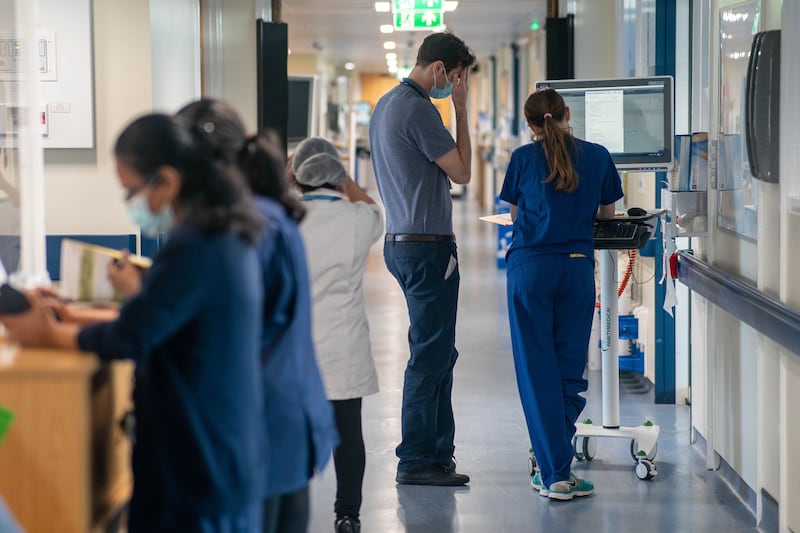AN A&E consultant with more than 30 years experience has warned the current pressures they're facing are "posing a great threat to patient and staff safety".
Dr Paul Kerr last night called on NHS management to urgently plan across the entire system due to the scenes he and his colleagues were witnessing, with vulnerable patients suffering from heart attacks and strokes on trolleys for up to two days.
Health trusts took to social media on Sunday and yesterday appealing to people to stay away from A&E units, expect in a medical emergency.
Dr Kerr, who is based in the Royal Victoria Hospital (RVH) in Belfast and is vice-president of the Royal College of Emergency Medicine for the north, said problems had escalated over the past month as Covid admissions soared.
Chronic shortages in the nursing workforce were also impacting on staffing levels, while the mental toll was "significant" with some consultants on sick leave due to the "intensity" of their workload.
"We now have a situation where staff are walking away from emergency departments. Some of our nurses are leaving so we have evenings where we're short of staff," Dr Kerr told The Irish News.
"There are very large number of patients - 50 to 100 patients - waiting to be seen at times. I know the health trusts are asking people not to come to hospital but the problem is that most of the patients on trolleys are the very sick people who are waiting to be admitted, not the patients with minor conditions.
"There are a small number of people who could be treated elsewhere, perhaps 15 per cent, but the truth is the problem is with the very sick patients. It is these vulnerable people, old people who have the strokes, the heart attacks, the cancers and sepsis who are lying on trolleys - or worse still sitting in the waiting room, still unknown to us.
"We are also seeing younger patients coming in, many of whom are unvaccinated. I would beg people to get vaccinated if they have the opportunity."
Hospital A&E departments at the RVH, Antrim Area, Craigavon and Ulster in Dundonald were among those tackling some of the biggest attendances as well as delays over the weekend - with more than 540 at the Royal alone.
With almost 400 Covid inpatients yesterday, Dr Kerr they were facing a difficult scenario with different patients competing for beds - which were already reduced following the pandemic.
He described emergency departments as a barometer for the entire health service, adding: "it tells you that the rest of system is not working well."
"We have funded beds that aren’t even open due to lack of staff or infection control. We are regularly told by management this is the case," the royal college chief said.
"The situation is worse than a few months ago and is compounded by the Covid crisis. Then there are problems with the medically fit patients awaiting discharge - there’s a lot of them - into the community and that becomes more difficult with Covid also.
"Our problem is not fundamentally with our speciality but the whole system. We have been warning that if there wasn’t planning given to emergency care it will impact on elective care."
In June, health minister Robin Swann unveiled a £700 million plan to slash hospital waiting lists.
Dr Kerr said the same focus needed to be applied to emergency settings.
"Your can’t do the impossible. If you’re no beds and you can’t give beds even to your emergency patients what hope is there to address the mountain of elective waiting lists. You have to add capacity somewhere to system.
"I am been in emergency medicine for over 30 years and what I am seeing is going to pose a great threat to patient and staff safety.
"We need to plan urgently for a very difficult time so we would encourage everyone within the health management system to formulate plans to prepare for a very, very difficult time for unscheduled care.
"Some of the decisions that had to be made for Covid need to be applied to the everyday world of running hospitals."







